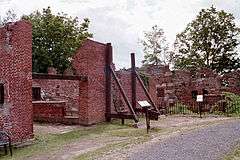Old Newgate Prison
|
Old New-Gate Prison | |
 | |
  | |
| Location | Newgate Road, East Granby, Connecticut |
|---|---|
| Coordinates | 41°57′43″N 72°44′44″W / 41.96194°N 72.74556°WCoordinates: 41°57′43″N 72°44′44″W / 41.96194°N 72.74556°W |
| Area | 5 acres (2.0 ha) |
| Built | 1775 |
| Architect | Unknown |
| NRHP Reference # | 70000839 |
| Significant dates | |
| Added to NRHP | October 15, 1970[1] |
| Designated NHL | November 28, 1972[2] |
Old Newgate Prison is a former prison and mine site on Newgate Road in East Granby, Connecticut. It is now operated by the state of Connecticut as the Old New-Gate Prison & Copper Mine Archaeological Preserve. Normally open to the public, it has been closed for restoration. As of July 2015, the re-open date is set for sometime in 2016. The site includes a colonial-era copper mine, and the remains of the state's first official prison, which was used between 1776 and 1782 to house prisoners of war from the American Revolutionary War. The site was designated a National Historic Landmark in 1972.[2]
Description and history
State records indicate that copper was discovered at this site on the west side of Talcott Mountain, then part of Simsbury, in 1705. A mine was in operation in 1707, created by digging a vertical shaft and tunneling horizontally, with additional vertical shafts dug for ventilation. The mine operated until 1745.[3] About half of the extant tunnels can be seen.[4]
The Colony of Connecticut then converted the tunnel network into a prison, naming it after London's Newgate Prison.[3] The first prisoner for whom the state has surviving documentation, John Hinson, was committed for burglary in 1773, and escaped in 1774.[5] During the American Revolutionary War, the prison was used to house Loyalists who fought against independence, as well as British prisoners of war. During this time the holding areas in the mines became known as "Hell", and the prisoners were employed as miners (although this turned out to be unprofitable).[3]
In 1790 it became a state prison, the first such in America. Most of the above-ground facilities present today were built between then and 1802. These include the main prison wall, and five brick-and-masonry buildings, all of which now stand in ruins.[3] In 1827, the remaining prisoners were transferred to the new, "state-of-the-art" Wethersfield State Prison. Attempts were made to reactivate the mines in the 1830s and 1850s, but these ventures failed.[3] The site has been considered a tourist attraction since the 1860s. Nearby Peak Mountain offers a bird's eye view of Old Newgate Prison from the Metacomet Trail.
The mine complex was acquired by the state historic commission in 1968. In the 1970s the state rehabilitated the old guardhouse for use as a visitors center and interpretive museum, and took other steps to stabilize the ruins. They also constructed a sloping tunnel to provide visitors access via stairs to the mines. The museum and grounds are, as of late 2014, closed to the public for restoration.
Old Newgate Prison was listed on the National Register of Historic Places in 1970, and was designated a National Historic Landmark two years later.[2][3] The site is now owned and administered by the State of Connecticut as a museum.
In 2006 an episode of Treasure Hunters sent the contestants to the prison.
 Postcard from late 1910s, early 1920s
Postcard from late 1910s, early 1920s View of same wall as Postcard in 2010
View of same wall as Postcard in 2010
See also
- List of National Historic Landmarks in Connecticut
- National Register of Historic Places listings in Hartford County, Connecticut
References
- ↑ National Park Service (2007-01-23). "National Register Information System". National Register of Historic Places. National Park Service.
- 1 2 3 "Old New-Gate Prison". National Historic Landmark summary listing. National Park Service. Retrieved 2007-10-03.
- 1 2 3 4 5 6 Charles W. Snell (January 4, 1972). "National Register of Historic Places Inventory-Nomination: Old Newgate Prison and Copper Mine" (pdf). National Park Service. and Accompanying 6 photos, exterior and interior, from 1971. (1.00 MiB)
- ↑ "Frequently Asked Questions - Newgate Mine". State of Connecticut. Retrieved 2014-12-17.
- ↑ "Prisoner List" (PDF). State of Connecticut. Retrieved 2014-12-17.